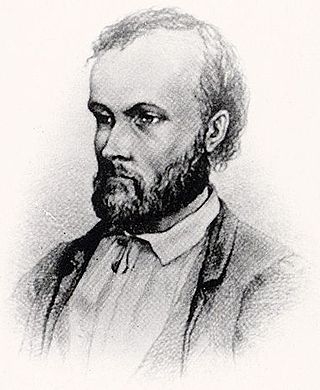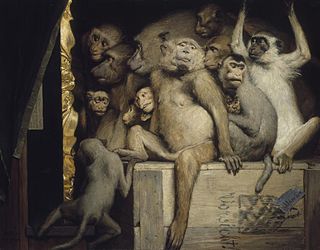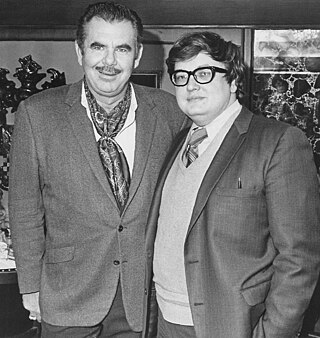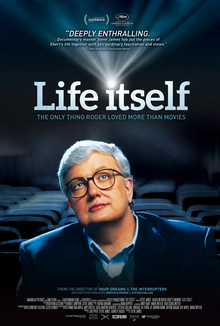
The Pulitzer Prize for Criticism has been presented since 1970 to a newspaper writer in the United States who has demonstrated 'distinguished criticism'. Recipients of the award are chosen by an independent board and officially administered by Columbia University. The Pulitzer Committee issues an official citation explaining the reasons for the award.

Roger Joseph Ebert was an American film critic, film historian, journalist, essayist, screenwriter, and author. He was a film critic for the Chicago Sun-Times from 1967 until his death in 2013.

Aleksis Kivi was a Finnish writer who wrote the first significant novel in the Finnish language, Seitsemän veljestä, published in 1870. He is also known for his 1864 play, Nummisuutarit. Although Kivi was among the very earliest writers of prose and lyrics in Finnish, he is still considered one of the greatest.

Seitsemän veljestä is the first and only novel by Aleksis Kivi, the national author of Finland. It is widely regarded as the first significant novel written in Finnish and by a Finnish-speaking author, and it is considered to be a real pioneer of Finnish realistic folklore. Today, some people still regard it as the greatest Finnish novel ever written, and in time it has even gained the status of a "national novel of Finland". The deep significance of the work for Finnish culture has even been quoted internationally, and in a BBC article by Lizzie Enfield, for example, describes Kivi's Seitsemän veljestä as "the book that shaped a Nordic identity."
Criticism is the construction of a judgement about the negative or positive qualities of someone or something. Criticism can range from impromptu comments to a written detailed response. Criticism falls into several overlapping types including "theoretical, practical, impressionistic, affective, prescriptive, or descriptive".

Music journalism is media criticism and reporting about music topics, including popular music, classical music, and traditional music. Journalists began writing about music in the eighteenth century, providing commentary on what is now regarded as classical music. In the 1960s, music journalism began more prominently covering popular music like rock and pop after the breakthrough of The Beatles. With the rise of the internet in the 2000s, music criticism developed an increasingly large online presence with music bloggers, aspiring music critics, and established critics supplementing print media online. Music journalism today includes reviews of songs, albums and live concerts, profiles of recording artists, and reporting of artist news and music events.

At the Movies is an American movie review television program produced by Disney–ABC Domestic Television in which two film critics share their opinions of newly released films. Its original hosts were Roger Ebert and Gene Siskel, the former hosts of Sneak Previews on PBS (1975–1982) and a similarly titled syndicated series (1982–1986). Following Siskel's death in 1999, Ebert worked with various guest critics until choosing Chicago Sun-Times colleague Richard Roeper as his regular partner in 2000.
Gene Siskel and Roger Ebert, collectively known as Siskel & Ebert, were American film critics known for their partnership on television lasting from 1975 to Siskel's death in 1999.

Rotten Tomatoes is an American review-aggregation website for film and television. The company was launched in August 1998 by three undergraduate students at the University of California, Berkeley: Senh Duong, Patrick Y. Lee, and Stephen Wang. Although the name "Rotten Tomatoes" connects to the practice of audiences throwing rotten tomatoes in disapproval of a poor stage performance, the direct inspiration for the name from Duong, Lee, and Wang came from an equivalent scene in the 1992 Canadian film Léolo.

Art criticism is the discussion or evaluation of visual art. Art critics usually criticize art in the context of aesthetics or the theory of beauty. A goal of art criticism is the pursuit of a rational basis for art appreciation but it is questionable whether such criticism can transcend prevailing socio-political circumstances.

Harold Charles Schonberg was an American music critic and author. He is best known for his contributions in The New York Times, where he was chief music critic from 1960 to 1980. In 1971, he became the first music critic to win the Pulitzer Prize for Criticism. An influential critic, he is particularly well known for his encouragement of Romantic piano music and criticism of conductor Leonard Bernstein. He also wrote a number of books on music, and one on chess.

Richard Nelson Corliss was an American film critic and magazine editor for Time. He focused on movies, with occasional articles on other subjects.
Armond Allen White is an American film and music critic who writes for National Review and Out. He was previously the editor of CityArts (2011–2014), the lead film critic for the alternative weekly New York Press (1997–2011), and the arts editor and critic for The City Sun (1984–1996). Other publications that have carried his work include Film Comment, Variety, The Nation, The New York Times, Slate, Columbia Journalism Review, and First Things.

Anthony Oliver Scott is an American journalist and cultural critic, known for his film and literary criticism. After starting his career at The New York Review of Books, Variety, and Slate, he began writing film reviews for The New York Times in 2000, and became the paper's chief film critic in 2004, a title he shared with Manohla Dargis. In 2023, he moved to The New York Times Book Review.

Critters is a 1986 American science fiction comedy horror film directed by Stephen Herek in his directorial debut, and co-written with Domonic Muir. It stars Dee Wallace, M. Emmet Walsh, Billy "Green" Bush and Scott Grimes in his film debut. The plot follows a group of small, furry aliens with carnivorous behavior escaping from two shape-shifting bounty hunters, landing in a small countryside town to feast on its inhabitants.
The concept of video games as a form of art is a commonly debated topic within the entertainment industry. Though video games have been afforded legal protection as creative works by the Supreme Court of the United States, the philosophical proposition that video games are works of art remains in question, even when considering the contribution of expressive elements such as acting, visuals, stories, interaction and music. Even art games, games purposely designed to be a work of creative expression, have been challenged as works of art by some critics.

Film criticism is the analysis and evaluation of films and the film medium. In general, film criticism can be divided into two categories: journalistic criticism that appears regularly in newspapers, magazines and other popular mass-media outlets; and academic criticism by film scholars who are informed by film theory and are published in academic journals. Academic film criticism rarely takes the form of a review; instead it is more likely to analyse the film and its place in the history of its genre or in the whole of film history.
Aleksis Kivi (1995–96) is an opera in two acts by Einojuhani Rautavaara, to a libretto by the composer. It was first performed by the Savonlinna Opera Festival on 8 July 1997, with Jorma Hynninen in the title role. The opera deals with episodes in the life of Aleksis Kivi, the Finnish national writer. The opera was written at the request of Hynninen.

Life Itself is a 2014 American biographical documentary film about Chicago film critic Roger Ebert, directed by Steve James and produced by Zak Piper, James and Garrett Basch. The film is based on Ebert's 2011 memoir of the same name. It premiered at the 2014 Sundance Film Festival and was an official selection at the 67th Cannes Film Festival. The 41st Telluride Film Festival hosted a special screening of the film on August 28, 2014. Magnolia Pictures released the film theatrically in the United States and simultaneously via video on demand platforms on July 4, 2014.

Christgau's Record Guide: Rock Albums of the Seventies is a music reference book by American music journalist and essayist Robert Christgau. It was first published in October 1981 by Ticknor & Fields. The book compiles approximately 3,000 of Christgau's capsule album reviews, most of which were originally written for his "Consumer Guide" column in The Village Voice throughout the 1970s. The entries feature annotated details about each record's release and cover a variety of genres related to rock music.















